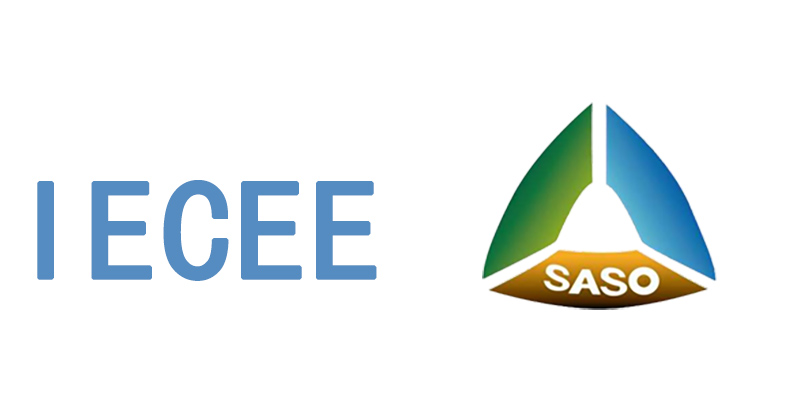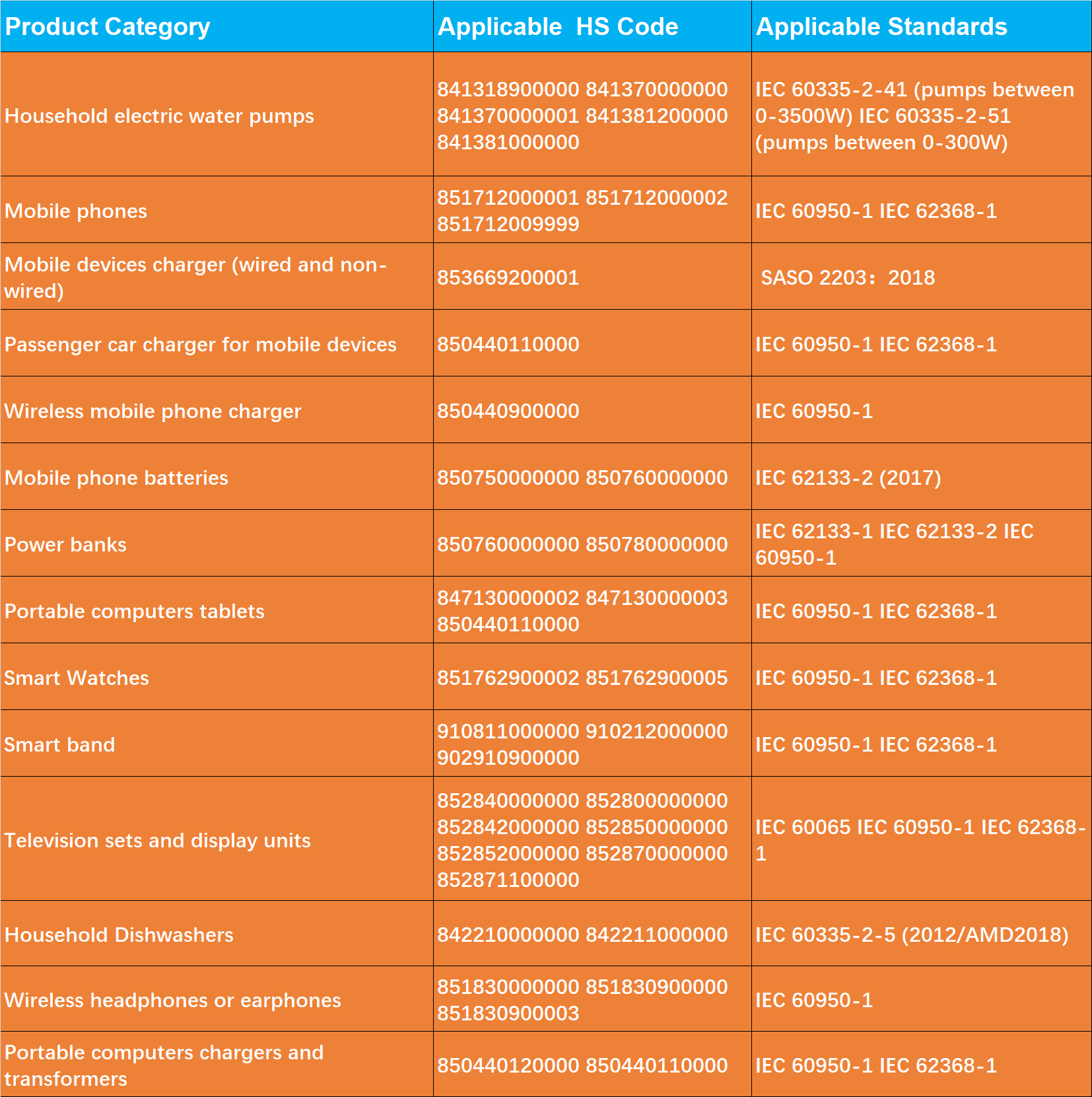
In February 2018, SASO started to implement a national scheme requiring several imported products to obtain a SASO IECEE certificate (CoPC) before being released in the Saudi market; Pioneer Testing will assist its clients under this new scheme by applying on their behalf as an Intermediary Applicant, whereby the exporter or importer or distributor (considered main applicants) remains fully responsible of the conformity of the product to the applicable standards and technical regulations. This procedure is applicable to Electrotechnical products requiring a National Conformity Certificate (CoPC), the CoPC is based on a Certification Body Test Certificate and a Certification Body testing laboratory test report in addition to several commitments to be undertaken by the supplier.
Client or Applicant: Any exporter or importer or distributor
Operated by the IEC System of Conformity Assessment Schemes for Electrotechnical Equipment and Components (IECEE), the IECEE CB Scheme is an international system for mutual acceptance of test reports and certificates dealing with the safety of electrical and electronic components, equipment and products. It is a multilateral agreement among participating countries and certification organizations, which aims to facilitate trade by promoting harmonization of national standards with International Standards and cooperation among accepted National Certification Bodies (NCBs) worldwide.
NCB which is, or has been appointed by, a Member Body of the IECEE, and accepted according to the IECEE Rules, and which is prepared to recognize CB Test Certificates for specified IEC standards as a basis for national certification or approval.
Is the Saudi NCB working under the Saudi Standards, Metrology & Quality Organization (SASO), and member of the IEC, and authorized to issue SASO IECEE certificates called: “CoPC”.
A testing laboratory which, after having been proposed as a candidate by an Issuing and Recognizing NCB, and which, after having been successfully assessed according to these Rules, is accepted into the CB Scheme.
A document used in the CB Scheme to provide evidence that representative specimens of a product were fully tested for compliance with the requirements of the relevant IEC standards accepted for use in the IECEE, and were found to be in conformity with those standards. A CBTC in conjunction with a CB Test Report is used as the means for mutual recognition of test results. A CB Test Certificate is valid only when the relevant CB Test Report (in agreed harmonised form, if available) is attached.
A report, utilizing the appropriate Test Report Form (TRF), containing the results of a product investigation, measurement and test data, and all relevant attachments. A CB Test Report covers the relevant test results, according to the requirements of the standard(s), including national differences, where requested, and all information necessary for identification of the product, such as type designation, ratings, description and photographs.
Document issued by SASO (the SNBC) as per the Saudi IECEE regulation and based on both the (CBTC) and (CBTR) confirming that the commodity complies with the applicable technical regulations or standard specifications of the International Electrotechnical Committee program of conformity assessment of the appliances and its electrotechnical component (IECEE) while taking in consideration the Saudi national deviations.
The Communications and Information Technology Commission (CITC) is the information and communications technology sector (ICT) regulator in the Kingdom of Saudi Arabia. The CITC is the communications regulator and the catalyst for the development of information technology in the Kingdom, its main responsibilities are: Granting licenses to provide telecommunications and information technology services
Managing tariffs of telecommunication and information technology services
Protection of users’ rights
Supervision and management of the National Numbering Plan
Setting service quality standards
Preparation of policies, regulatory frameworks and studies of ICT sector in the Kingdom of Saudi Arabia Interconnection
Managing frequency spectrum
Approving communication and information technology devices (CITC certificates)
Supervision of the National Committee for Information Society
Content Filtering Service
CITC Initiatives to develop information technology sector
Radiofrequency Electromagnetic Fields
This procedure covers the following products, the below mentioned HS codes have been confirmed to be checked by the Saudi customs but they are not definitive, remaining products for which the HS code is not mentioned below may be subject, contact the Technical Adviser incase of doubt:

- Small-scale Solar Photovoltaic (PV) systems (solar PV of not more than 1 MW capacity that is installed in any occupied or unoccupied land, building, enclosure or other place with an exit point of connection to the distribution system and connected in parallel to the distribution system), the applicable standards are the following:

Shipments containing products covered by this procedure require the CoPC in order to be cleared at the borders during import, it is not mandatory that these shipments be covered by regular Certificates of Conformity (CoC), however it is highly recommended that these shipments be accompanied by CoCs to avoid possible delays at the borders, since the CoPCs are not related to the shipment’s invoice.
The client shall provide at least the following documents:
a) Application form to Bureau Veritas: “SASO IECEE - Intermediate Applicant Authorization form”
b) Valid Commercial Registry of the legal representative of the client in Saudi Arabia
c) Valid Industrial license of the factory
d) Valid Test certificate (CBTC) issued from a recognized national certification body
e) Test Report (CBTR) issued by a recognized IECEE CB scheme laboratory (CBTL)
f) Test Reports covering the national deviations in the Kingdom of Saudi Arabia for the product (in case not covered by the CBTC and/or CBTR)
g) The validity of the CBTC shall be equal or less than 3 years (CBTCs older than 3 years shall be treated on a case by case basis upon approval by SASO)
h) Pictures of the product (4 at least) covering at least: The country of origin of the product, model number of the product, rating plate of the product
i) Dimensions of the product
j) A duly signed and stamped letter (on the official company letterhead of the applicant) containing the following:
i. Commitment to provide samples for assessment when required by SASO
ii. Commitment to accept retesting, inspection, factory audit when required by SASO
iii. Commitment to provide any additional information related to the product and facilitate sampling when required iv. Commitment to pay all fees related to the application process
v. Commitment to pay all transportation and testing fees resulting from market surveillance or shipment monitoring
k) Separate Declaration that the same application has not been lodged with any other Third Party for the model subject to the IECEE certification
l) If telecommunication product including or that can use a SIM card, a valid CITC type approval certificate m) Declaration of conformity* of the products to the related technical regulations, applicable standards and national deviations in the Kingdom of Saudi Arabia (two separate documents to be filled, one by the manufacturer and one by the importer).
*The DoCs may be on the “SAU IECEE - Annex 1 – Importer Declaration of Conformity” and “SAU IECEE - Annex 2 – Manufacturer Declaration of Conformity” available on Connections, or on any similar format issued on the manufacturer’s letterhead and including all the details depicted in the mentioned Annexes.
Note: - CBTCs are issued based on CBTRs issued by CBTLs. - Documents shall be officially in Arabic or English; translated documents shall be attested by the Saudi Embassy in their country of issuance, or translated and attested in Saudi Arabia by a sworn translator.
1. The issuance of a CoPC will be suspended for a product in case SASO withdraws the standard related to this product from its recognition scope.
2. The CoPC shall be cancelled in the following cases:
If the product is no longer complying to the samples that have been tested and detailed in the test report (CBTR) attached to the certificate (CBTC)
In case of misuse of the CoPC
In case the applicant requests to cancel the CoPC
If the CoPC owner doesn’t apply for a renewal request
If the product is no longer complying with the latest issue of the applicable standard
If the product has been changed without informing SASO
3. The certificate is valid to the model detailed in the CoPC and it’s not allowed to use it for any other model.
4. The CoPC is valid for one Gregorian year starting from the date of issuance.
5. The application for a renewal of CoPC shall be (60) days at least prior to the expiry date of the CoPC.
6. The CoPC will not be issued if the Test certificate (CBTC) or test report (CBTR) is no longer valid.
7. If the information of the manufacturer or the supplier or the factory had changed, then a new test certificate (CBTC) shall be requested to issue the CoPC.
For more information, please contact




Follow official WeChat
We are a third-party testing agency that integrates inspection, testing, certification, and technical support. Welcome to inquire.